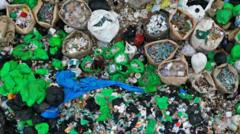Countries around the globe have hit a stalemate in their negotiations to create a comprehensive treaty for tackling plastic pollution, extending over two years without resolution. Representatives from more than 200 nations gathered in Busan, South Korea, for what was intended to be a concluding round of discussions. Yet, significant fractures were evident, primarily between close to 100 countries advocating for a phased reduction of plastic use and oil-producing nations concerned about the potential economic consequences of such an approach.
"The aim of this treaty is to eliminate plastic pollution, not necessarily the material itself, which has significant societal benefits," expressed negotiators from Kuwait during the final hours of deliberations. In a 2022 consensus, nations acknowledged the urgent need for a unified global approach to address plastic pollution, particularly emphasizing its severe impact on marine ecosystems, with hopes to finalize a treaty swiftly.
Since 1950, the global production of plastic has surpassed eight billion tonnes, with recycling rates lingering under 10%, as per UN estimates. This escalating issue has caused millions of tonnes of plastic waste to infiltrate oceans, posing significant risks to marine life, as animals can get entangled or ingest harmful debris, leading to mortality.
In addition to harming wildlife, plastic production relies heavily on fossil fuels, believed to account for 5% of total global emissions. Therefore, limiting plastic output could align well with broader climate change mitigation efforts.
The latest meeting in South Korea was expected to produce a conclusive agreement, but unresolved disagreements hindered progress. "A few critical issues inhibit our ability to draft a comprehensive agreement," stated Luis Vayas Valdivieso, chairperson of the talks, on the closing day. Despite the multitude of topics covered, the main contention remained Article 6, which considered whether nations should be mandated to curtail plastic production or merely enhance recycling efforts.
A coalition of 95 nations, including the UK, EU, and several South American countries, advocated for Article 6 to incorporate a legally binding obligation to reduce production levels. "We bear the weight of expectations from our citizens, who rely on us to safeguard them and our environment from the plastic pollution crisis," urged Mexico's chief negotiator Camila Zepeda, receiving widespread support within the assembly.
However, a faction of oil-rich countries, including Kuwait, Iran, and Russia, expressed vehement opposition to such commitments. Amid the anticipated decline in oil demand due to the shift towards renewable energy, these nations perceive plastic as a critical sector for economic growth, further complicating their stance.
Delegates from India also raised concerns about production cuts affecting their developmental aspirations. Environmental organizations and scientists expressed dismay at the deadlock, attributing the influence of fossil fuel interests as a significant factor in the inability to achieve a resolution.
A report from InfluenceMap revealed numerous interventions from the petrochemical industry throughout the negotiations, predominantly against proposals for production reductions. However, key plastic product manufacturers like Unilever and Nestlé are advocating for consistent regulations to address the crisis.
Nestlé's global public affairs lead for sustainability, Jodie Roussell, characterized the outcome as disappointing, stressing the necessity for immediate collective action. Expectations are for nations to reconvene next year in hope of reaching an accord. Eirik Lindebjerg from the World Wildlife Fund urged the coalition of 95 countries to pursue an independent treaty, emphasizing that their collective will reflects broader global aspirations to tackle plastic pollution effectively.

















